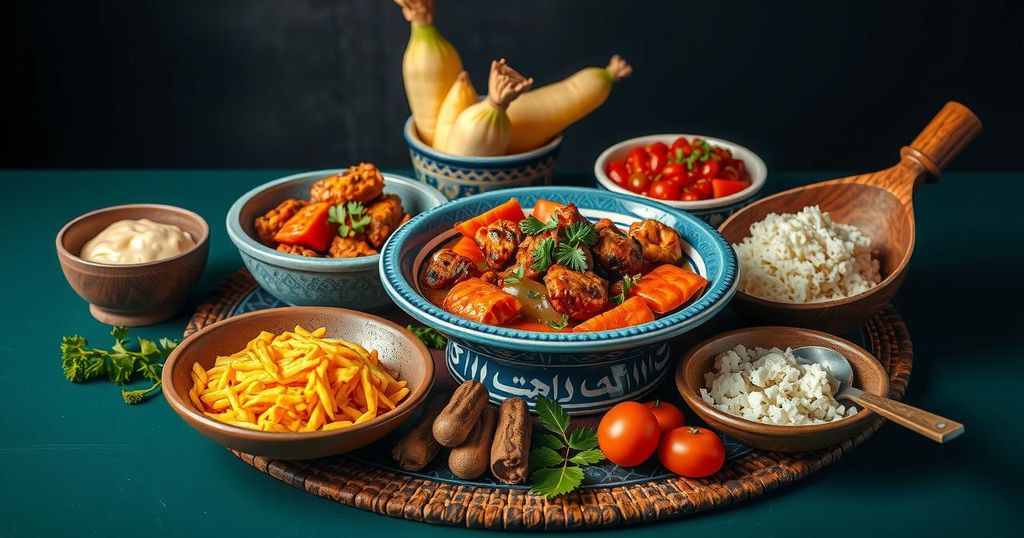Exploring Kazakh Cuisine: A Journey Through Taste and Tradition
Kazakh cuisine, celebrated for its rich heritage and deep ties to the concept of home, features horse meat as a staple ingredient. The award-winning Auyl restaurant is a prime example of this culinary tradition, which balances contemporary dining with age-old practices. As highlighted by Aida Haidar, exploring local dishes fosters a deeper understanding of Kazakh culture, emphasizing communal relationships and the importance of authentic experiences.
Kazakh cuisine is a vibrant reflection of the nation’s rich heritage and the deep connection between food and home. Recently, Almaty’s Auyl restaurant has garnered international acclaim, being named one of the 16 Most Beautiful Restaurants in the World by Prix Versailles. As Aida Haidar, News Editor at The Astana Times, highlights, Kazakh food is fundamentally rooted in its nomadic culture, primarily characterized by the utilization of horse meat as a staple ingredient. This culinary tradition is more than simply sustenance; it evokes a sense of home for Kazakhs, particularly in a country known for its harsh climate. The unique offerings of Kazakh cuisine often surprise foreign visitors, who are encouraged to embrace this aspect of cultural identity without preconceived notions. As Ms. Haidar reflects on her travels, she emphasizes the importance of approaching local dishes with an open mind. The historical context of Kazakh life, marked by generations of nomadism, has led to a cuisine that is not only hearty but essential for survival, particularly during challenging winters. In modern Kazakhstan, the culinary landscape has evolved. An increasing number of restaurants are appearing, celebrating traditional dishes while also catering to contemporary tastes. Auyl, located at the foot of the Shymbulak mountains, offers a unique experience, blending the aesthetic of nomadic life with exquisite dishes such as baursak, balqaimaq, and marrow bones. These dishes underscore the integral role of fat in Kazakh cuisine, providing sustenance reminiscent of the nomadic lifestyle. Visitors to Astana are encouraged to try beshbarmak, a quintessential Kazakh dish that exemplifies the sense of comfort associated with home-cooked meals. For many local families, this dish holds sentimental value, often served during significant occasions. The horsemeat broth accompanying this dish enhances its status as a comforting staple, rejuvenating the spirit and providing a communal experience that is central to Kazakh culture. The dining experience at establishments like Qazaq Gourmet is further enriched by Kazakh interiors and modern reinterpretations of traditional settings. Here, food serves as a vessel for cultural expressions, inviting guests to indulge in flavors that symbolize the vastness and beauty of Kazakhstan’s natural offerings. Alternatively, Selfie captures a blend of traditional tastes and luxurious elements, emphasizing local ingredients with tempting dishes like horse heart tartare. The significance of tea within Kazakh culture cannot be overstated, representing warmth and hospitality. The notion of sharing tea, especially when flavored into ice cream, reflects the intimate ties between Kazakh customs and culinary art. While restaurant experiences are invaluable, Ms. Haidar suggests that the ultimate encounter with Kazakh food occurs within the context of a local home, where the authentic flavors and the spirit of togetherness are most palpably felt, illuminating the essence of home through food.
Kazakh cuisine is deeply intertwined with the country’s nomadic heritage, characterized by its reliance on meat, particularly horse meat, as a cornerstone of sustenance. This culinary tradition has shaped the identity of Kazakhs, offering nourishment and comfort in a challenging climate. The recent international recognition of restaurants like Auyl underlines a resurgence in interest toward traditional food preparation and consumption, showcasing the balance between embracing modern culinary trends and honoring age-old practices that reflect the culture’s values. As such, Kazakh food represents not only the flavors of the region but also a sense of belonging and community that has endured through generations.
In conclusion, Kazakh cuisine is a profound embodiment of cultural identity, merging traditional flavors with the contemporary dining experience. The emphasis on meat, particularly horse meat, resonates with the historical ways of life for Kazakhs. Establishments like Auyl and Qazaq Gourmet offer visitors a window into this rich heritage while recommending an authentic culinary experience through home-cooked meals. The act of sharing food among family and friends continues to reinforce the bonds of kinship, creating an enduring connection to the concept of home.
Original Source: astanatimes.com




Post Comment